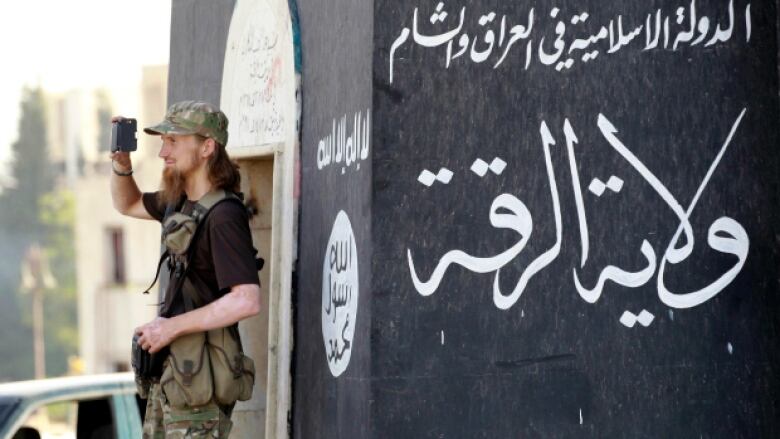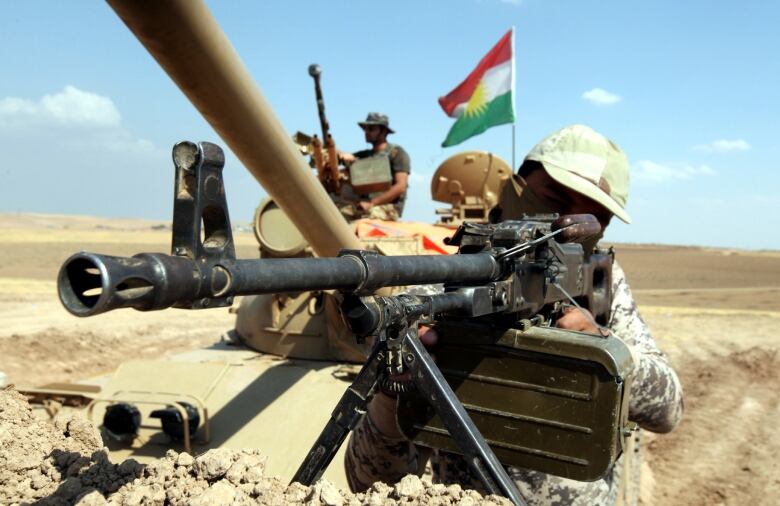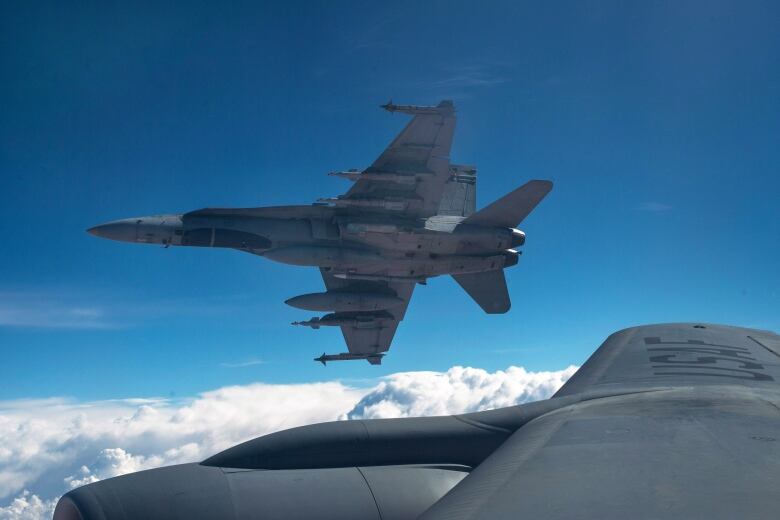ISIS getting 'desperate,' struggling to replenish fighters
U.S.-led airstrikes, Kurdish Peshmerga fighters having significant effect

Recent threats and hostage-taking by the Islamic State in Iraq and Syria are a reminder that the jihadist group still has the ability to scare foreign governments.
- ISIS extends deadline for Jordanian hostage
- ISIS fight: Canadian advisers guiding airstrikes but U.S. barred from doing same
- What's in Canada's new anti-terrorism legislation
But despite its bluster, military analysts say the Sunni extremists known as ISIS are suffering on the battlefield.
"We're seeing a lot of signs from them that they're desperate," says Scott Stewart, vice-president of tactical analysis at Stratfor, a global intelligence and advisory firm based in Austin, Tex.
The U.S. ambassador to Iraq reported last week that airstrikes undertaken by the U.S. and coalition partners had killed approximately 6,000 ISIS fighters since they began in August.
While it's difficult to verify those numbers, "it's clear the air war has done severe damage to their manpower," says Wayne White, who worked for several decades as an Iraq analyst for the U.S. government.
The recent liberation of Kobani, a city in northern Syria near Turkey that had been the site of a three-month battle with ISIS, can be seen as an important victory for the Western-backed Kurds and a sign of ISIS's military weakness.

"The last group of fighters that [ISIS] sent to Kobani were kids teenagers, 15-year-olds, 16-year-olds. That shows that they're having problems," says Stewart.
"Not only are they suffering losses, but they're having problems replenishing their ranks."
Dwindling numbers
ISIS, which declared a caliphate spanning eastern Syria and western Iraq last June, has been waging battle with a broad internationalcoalition since summer.
While Iraqi soldiers, Shia militia and Kurdish Peshmerga fighters have been on the front lines against ISIS since the beginning, the U.S. and partners such as Britain, France and Canada started providing airstrikes in late summer.
Ascertaining exactly how many people are fighting with ISIS has been notoriously difficult, with U.S. intelligence estimates anywhere between 9,000 and 25,000.
So a loss of 6,000 fighters, if accurate, would represent a substantial dent in its ranks.
ISIS, though, has been continuing its recruitment efforts, most notably through social media. But efforts by neighbouring countries such as Turkey to tighten borders have had a noticeable effect in decreasing the number of foreign fighters that make it to the so-called Islamic State, says Stratfor's Stewart.
Also, the foreign fighters that have gotten through are undoubtedly enthusiastic, but are nowhere near as valuable as battle-hardened veterans, says White, a scholar at the Middle East Institute in Washington, D.C.
Given the general inexperience of the foreign fighters, many of them are treated as "waste material," he says.
"If there's brutal fighting to be done, and 60 guys have to take a hill, they're going to have the foreign fighters out front. The veterans are in the back for two reasons: they're less likely to get hit and to keep the others from running away."
White says that maintaining its fighting force has become such an issue that ISIS recently appointed a new police force in Raqqa, the declared capital of the Islamic State, in order to "go door to door and roust out fighters that were shirking their duties and hiding from the battlefront."

In addition to inflicting personnel losses, coalition forces have done serious damage to ISIS's oil and gas operations near Mosul and Tikrit.
These sites represent a "titanic source of income for the group," writes Rita Katz, director of the SITE Intelligence Group, in a recent blog post.
Katz says that airstrikes on oilfields and refineriesalong with the tanking price of oil which ISIS was already selling at a discount on the black market have made a significant dent in the group's revenues.
A lot of combat to come
Even so, these signs "don't mean that ISIS is on the verge of collapsing," says Peter Mansoor, a retired U.S. Army officer and author of Surge: My Journey with General David Petraeus and the Remaking of the Iraq War.
"There's still a lot of combat to play out in the months and perhaps even years ahead," he says.
Mansoor says that ISIS is still "well-ensconced" in the areas they control, and although they may be losing ground in Diyala province in Iraq, they're still gaining ground in its southwestern Anbar Province.
A development that could tilt the fight in the coalition's favour, he says, is another "Anbarawakening" that is, if Sunni tribes in Iraq's south collectively turned against ISIS the way that they did against al-Qaeda during the Iraqi civil war in 2006.
But that might be a tough sell for the Sunni tribes, says Mansoor, given that they received very little for their support the last time, having to defend themselves not only against al-Qaeda but the Shia-majority Iraqi government.
"This time, they're going to need some sort of tangible political deal from Baghdad, whether it's regional autonomy, a share of the oil revenue, their own police force, perhaps their own national guard unit," says Mansoor.
"They're going to need something more than promises, or they're going to stay on the sidelines, at best, and maybe even side with ISIS, as they have been."












_(720p).jpg)


 OFFICIAL HD MUSIC VIDEO.jpg)
.jpg)



























































































